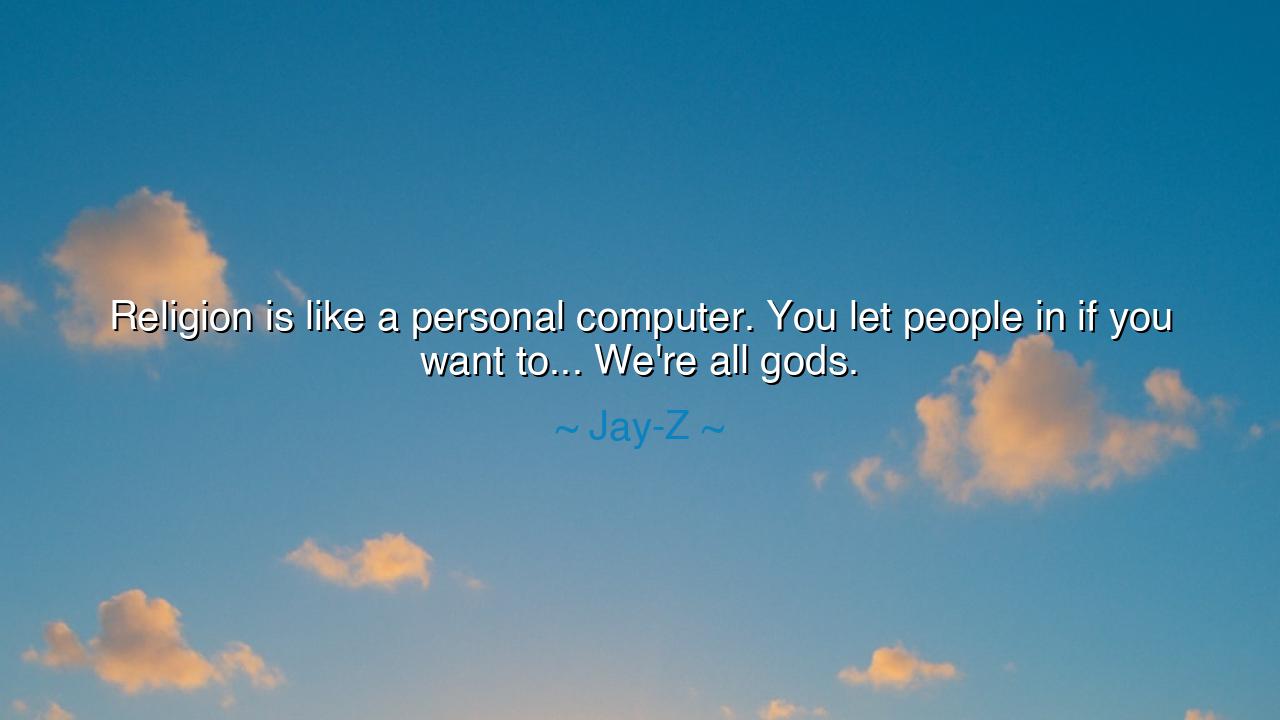
Religion is like a personal computer. You let people in if you
Religion is like a personal computer. You let people in if you want to... We're all gods.






“Religion is like a personal computer. You let people in if you want to... We’re all gods.” Thus spoke Jay-Z, a poet of the modern age, born not among philosophers but among the struggle and rhythm of the streets. In this metaphor—at once daring and divine—he speaks not to the arrogance of man, but to the sacred power within him. He reminds us that faith, identity, and divinity are not possessions granted by priests or institutions, but forces that dwell in the hidden chambers of the self. Like a personal computer, the soul is a vast engine of creation and consciousness. Its codes are private, its fire personal. It is each man’s choice whom to let in—to share his truth, his light, his faith—and it is his responsibility to tend to it, to keep it from corruption.
Jay-Z’s words rise from a time when religion, once a unifying force, had too often become a battlefield of division. The modern man, surrounded by systems and screens, began to seek God not in cathedrals, but in consciousness itself. In this quote, he transforms an image of technology—the personal computer, symbol of human innovation—into an emblem of spiritual autonomy. For what is a computer but the mind made visible? What is the soul, then, but the divine processor of creation? Jay-Z’s insight is that each human being carries within him the code of divinity, and that faith, like a program, must be run from within, not imposed from without.
To say “We’re all gods” is not blasphemy in this context—it is revelation. It is the same truth whispered by the sages of old. The ancients said that man was made in the image of God, that the divine spark dwells within every heart. The poets of Greece spoke of the fire Prometheus stole from heaven, placed within humanity so they might rise above the beasts. The mystics of the East have long taught that the divine is not a being outside us, but a consciousness within us—that the soul is a mirror in which the eternal sees itself. Thus, Jay-Z’s declaration is not the cry of pride, but the awakening of identity: that we are co-creators, architects of meaning, capable of shaping our destiny through thought, intention, and will.
Consider the story of Moses as told in the sacred writings. When he beheld the burning bush, trembling before the Infinite, he asked, “Who shall I say sent me?” And the voice replied, “I AM THAT I AM.” It was not a name, but a revelation: the divine exists in being itself. Jay-Z’s metaphor carries the same echo. Each of us, by the mere fact of existence, carries the “I AM”—the spark of awareness that connects us to the eternal. To recognize that we are “gods” is to recognize that our choices, our words, and our love have creative power—that we shape the worlds we inhabit by the energy we radiate.
Yet, the poet warns subtly: a computer can be corrupted; a mind can be manipulated. Just as the unguarded system falls to the virus, so the unguarded soul falls to the influences of greed, hatred, and fear. You let people in if you want to, he says—a reminder that the gates of the spirit are our own to open or close. We must choose with wisdom whom we allow into our inner world—what ideas we accept, what voices we heed, what energies we entertain. In the age of noise and endless connection, this is sacred advice. Guard your temple, yet do not seal it. Share your light, yet protect its source.
In Jay-Z’s metaphor, religion is not abolished; it is reclaimed. It is no longer the authority of institutions, but the awakening of individuals. To live as if you are divine is not to demand worship, but to take responsibility for your own creation—to live with purpose, to build with love, to master your mind as one masters a tool of immense power. Just as the computer must be programmed carefully to produce truth and not error, so too must the soul be aligned with compassion and understanding if it is to express the divine fully.
So, my child of the digital and the divine, take this lesson to heart: your soul is your temple, your mind is your altar, your life is your creation. Use your inner power not to dominate, but to illuminate. Let no one dictate your connection to the sacred. Seek wisdom, but never surrender your autonomy. Feed your spirit with love, discipline, and art, and your “system” will radiate light into the world. Remember, to say “We are gods” is not to claim supremacy—it is to accept stewardship over the miracle of existence.
Thus, Jay-Z’s words, though modern in form, echo the ancient wisdom of every prophet and poet: the divine is not far away—it is within you. You are the creator and the creation, the question and the answer, the seeker and the light. Treat your mind as holy ground, your heart as sacred fire, and your life as the prayer that never ends. In that awareness, you will no longer seek the gods in heaven, for you will have found them—alive, awake, and infinite—within yourself.






AAdministratorAdministrator
Welcome, honored guests. Please leave a comment, we will respond soon